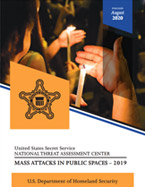 U.S. Department of Homeland Security
U.S. Department of Homeland Security
Overview: While our nation responds to the challenges of the COVID-19 pandemic, we must also contend with the tragic aftermath of mass violence that has impacted our communities. Acts of targeted violence affect cities and towns of all sizes, and impact individuals in the places where we work, learn, and otherwise carry out our daily activities. The response to this problem, like many others, requires a community-oriented approach. Although law enforcement agencies plays a central role in preventing targeted violence, they must be joined by government officials and policy makers, mental health providers, employers, schools, houses of worship, and the general public, all of whom have a role to play in keeping our communities safe.
Since its founding in 1998, the U.S. Secret Service National Threat Assessment Center (NTAC) has supported our federal, state, and local partners in the shared mission of violence prevention. NTAC’s research, which informs the U.S. Secret Service’s approach to countering targeted violence, called threat assessment, has been made available not only to public safety professionals, but also the general public. To enhance the impact of these research findings, NTAC has delivered more than 2,000 trainings to over 180,000 public safety professionals. In addition to law enforcement, these events benefit mental health workers, school officials, and other community stakeholders.
NTAC has further offered direct consultation to law enforcement agencies and other partners on how to establish threat assessment programs, tailored to the needs of each community. These programs are designed to prevent targeted violence using the U.S. Secret Service’s behavior-based methodologies, which involve proactively identifying and intervening with individuals who pose a risk of violence.
